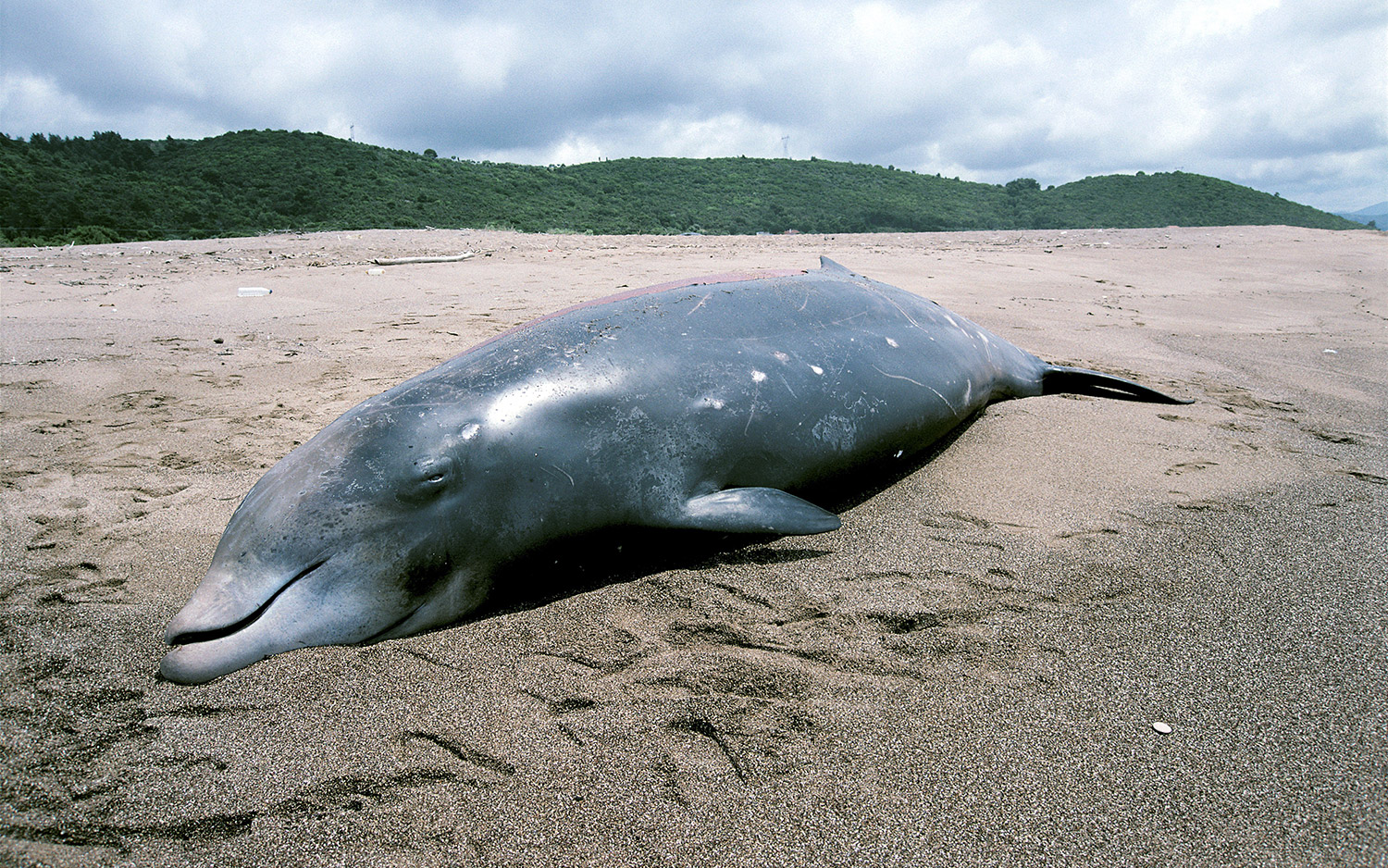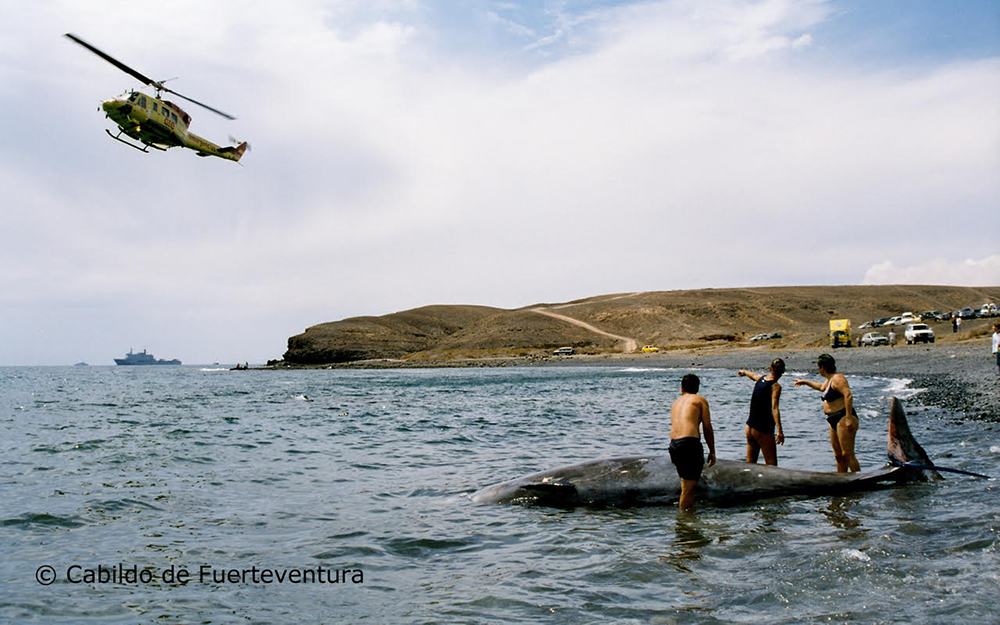Sonar Can Literally Scare Whales to Death, Study Finds

Naval sonar has been linked to mass strandings of otherwise-healthy whales for nearly two decades, but the precise mechanisms of how it affects whales has eluded scientists. Now, researchers have explained key details of how this disruptive signal triggers behavior in some whales that ends in death.
Previously, necropsies of beaked whales from multiple stranding incidents found nitrogen bubbles in their body tissues, a hallmark of decompression sickness, or "the bends." This dangerous condition also affects scuba divers when they rise too rapidly from deep water; it can cause pain, paralysis and even death.
Whales are adapted for deep-sea diving, and beaked whales are the record-holders for the longest and deepest dives. But the new research explains how sonar in certain frequencies disorients and terrifies some beaked whales so much that the experience overrides an important adaptation for deep diving: a slower heartbeat. Extreme fear accelerates a whale's heart rate, which can lead to decompression sickness; the intense pain of this condition incapacitates the whales, so they strand on beaches and eventually die, scientists reported in a new study. [Whale Photos: Giants of the Deep]
Mass strandings of Cuvier's beaked whales (Ziphius cavirostris) were almost unheard of prior to 1960, but that changed with the introduction of midfrequency active sonar (MFAS) in naval exercises in the open ocean. This type of sonar, developed in the 1950s for submarine detection, operates in a range of 4.5 to 5.5 kHz, according to the study. After this sonar appeared, mass stranding events soon skyrocketed for beaked whales, with 121 such strandings taking place between 1960 and 2004, the researchers wrote.
Scientists first noted a connection between mass strandings of Cuvier's beaked whales and naval exercises using sonar in the late 1980s, lead study author Yara Bernaldo de Quirós, a researcher at the Institute for Animal Health and Food Safety at the University of Las Palmas de Gran Canaria in Spain, told Live Science in an email.
That link strengthened after similar stranding events in Greece in 1996 and in the Bahamas in 2000, de Quíros added. And in September 2002, when 14 beaked whales stranded in the Canary Islands during a NATO naval exercise, veterinary pathologists discovered lesions in the animals that were "consistent with a decompression sickness," de Quirós said.

Fight or flight
In 2017, biologists studying beaked whales gathered for a workshop to analyze findings about strandings from the past decades, looking at mass strandings that were linked to nearby naval exercises using sonar.
Sign up for the Live Science daily newsletter now
Get the world’s most fascinating discoveries delivered straight to your inbox.
Between 2002 and 2014, six mass strandings took place in Greece, the Canary Islands and Almería in southeastern Spain, but the dead whales did not appear to be malnourished or sick. However, they displayed "abundant gas bubbles" throughout their veins, blood clots in multiple organs and microscopic hemorrhages "of varying severity" in body tissues.
Beached whales may have experienced "a fight or flight response" that overrode a key diving adaptation: the lowering of heart rate, which reduces oxygen consumption and prevents nitrogen accumulation. The result was hemorrhages and "massive bubble formation in their tissues," de Quirós explained.
These symptoms of decompression sickness likely afflicted the whales after they were spooked by sonic blasts, according to the study.
"The temporal and spatial association with naval exercises with use of sonar is very clear," de Quíros said in the email. What's more, behavioral studies have shown that whales that have never encountered sonar (or that have been exposed to it only occasionally) typically exhibit a stronger response than animals living near military outposts, she added.
In 2004, Spain banned sonar in Canary Islands waters, a mass-strandings hotspot. No mass strandings have taken place since the ban was enacted, "proving the effectiveness of this mitigation," de Quíros said.
Based on their findings, the study authors recommended more-widespread bans on military exercises using sonar across the Mediterranean Sea, where atypical mass strandings of beaked whales still take place. Further research will determine the long-term impact of mass strandings on beaked whale populations, the authors wrote in the study.
The findings were published online today (Jan. 30) in the journal Proceedings of the Royal Society B.
- The 22 Weirdest Military Weapons
- Images: Sharks & Whales from Above
- Marine Marvels: Spectacular Photos of Sea Creatures
Originally published on Live Science.

Mindy Weisberger is an editor at Scholastic and a former Live Science channel editor and senior writer. She has reported on general science, covering climate change, paleontology, biology and space. Mindy studied film at Columbia University; prior to Live Science she produced, wrote and directed media for the American Museum of Natural History in New York City. Her videos about dinosaurs, astrophysics, biodiversity and evolution appear in museums and science centers worldwide, earning awards such as the CINE Golden Eagle and the Communicator Award of Excellence. Her writing has also appeared in Scientific American, The Washington Post and How It Works Magazine. Her book "Rise of the Zombie Bugs: The Surprising Science of Parasitic Mind Control" will be published in spring 2025 by Johns Hopkins University Press.










